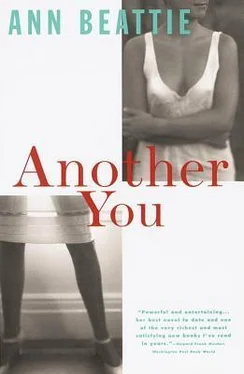Ann Beattie - Another You
Здесь есть возможность читать онлайн «Ann Beattie - Another You» весь текст электронной книги совершенно бесплатно (целиком полную версию без сокращений). В некоторых случаях можно слушать аудио, скачать через торрент в формате fb2 и присутствует краткое содержание. Год выпуска: 2014, Издательство: Vintage Books, Жанр: Современная проза, на английском языке. Описание произведения, (предисловие) а так же отзывы посетителей доступны на портале библиотеки ЛибКат.
- Название:Another You
- Автор:
- Издательство:Vintage Books
- Жанр:
- Год:2014
- ISBN:нет данных
- Рейтинг книги:5 / 5. Голосов: 1
-
Избранное:Добавить в избранное
- Отзывы:
-
Ваша оценка:
- 100
- 1
- 2
- 3
- 4
- 5
Another You: краткое содержание, описание и аннотация
Предлагаем к чтению аннотацию, описание, краткое содержание или предисловие (зависит от того, что написал сам автор книги «Another You»). Если вы не нашли необходимую информацию о книге — напишите в комментариях, мы постараемся отыскать её.
Another You — читать онлайн бесплатно полную книгу (весь текст) целиком
Ниже представлен текст книги, разбитый по страницам. Система сохранения места последней прочитанной страницы, позволяет с удобством читать онлайн бесплатно книгу «Another You», без необходимости каждый раз заново искать на чём Вы остановились. Поставьте закладку, и сможете в любой момент перейти на страницу, на которой закончили чтение.
Интервал:
Закладка:
He said, “I have heard that.” He wanted to get off the phone. He had called someone who was drunk, whose life was a mess, who had been deceived all her life and then slapped in the face.
“And to think: I used to write her letters asking if she had dates. I thought she might be at dances, or going to parties and building snowmen — the pictures I’d seen in the Benson College catalog. Are you sure you don’t want to come by so we can cry on each other’s shoulders? You don’t exactly seem to be holding up your end of the conversation.”
“I’m eleven hundred miles away,” he said.
“You are? Where are you?”
“Islamorada,” he told her again. He wouldn’t blame her for not believing him; it sounded like an invented name for an invented place. Islamorada. How about Uranus? Just some strange point on the planet where he was standing in a parking lot, talking on the phone. Why? Why had he not learned that McCallum and everything associated with McCallum did nothing but cause him pain. He was a compulsive liar. Dangerous, probably. Set on a trajectory he sucked people into, tossing them aside at his convenience. He felt humiliated for both of them — for himself, and for Janet Lanier. To know McCallum was to be humiliated by your own vulnerabilities.
In the parking lot, a windblown couple got out of an old Olds-mobile convertible, the woman taking off her visor and running her fingers through her hair, the man in a tank top and white Bermuda shorts bending forward and backward to stretch himself. Though the lot was mostly empty, it held quite an assortment of cars: a blue Miata with New Mexico plates that read GOERNER; a Jeep; Toyotas; BMWs. There were window boxes filled with bright pink flowers and drips of dark green ivy. Over one of the window boxes a monarch butterfly hovered. Two monarch butterflies. He thought of a photograph he had once seen of Vladimir Nabokov running with his butterfly net. He thought of Lolita . What a second-rate Lolita Cheryl Lanier had been — not particularly pretty, but most of all, distinct from Lolita in that she had not been genuinely needy; she was just another person who wanted things.
“Do you believe me when I tell you I didn’t have the slightest idea that McCallum and your daughter—”
“That makes two of us,” she said. “I’m glad to know it doesn’t have something to do with my lack of sophistication.”
“Sophistication,” he said. “I don’t think it’s a lack of sophistication. It’s just not possible to keep up with him.”
“You get thrown off by people who go to great lengths to explain themselves,” she said. “What I mean is, you take what they say to be explanations. I kept his letters explaining himself from the end of that summer until about 1975. I got rid of most of them when we moved. While I was packing boxes I reread them, and you know what? I was a grown woman by then, and I didn’t believe any longer I’d been the great love of his life, but I believed he still missed me. That I was special.”
“I’m sorry,” Marshall said. It sounded lame, inconclusive. It was probably the last time he would speak to Janet Lanier.
The man in white Bermudas came out carrying a bag of takeout food. The woman in the visor held his hand. An ordinary couple , he thought. Then he immediately wondered if there was such a thing as an ordinary couple.
“Your husband,” he said to Janet Lanier. “Is it true he’s got a girlfriend in Michigan?”
“True,” she said.
Why had he asked? He stared after the couple, the woman giving a little skip as she leaned into him and appeared to be saying something joking. He could not remember the last time he and Sonja had seemed close — close and casual about the closeness. They had let too many things from outside influence their moods: the routine of their jobs; Evie’s illness. Then he had an image of Cheryl Lanier, appearing like an apparition in the snowstorm, his pulling over to give her a ride, the moment when he involved himself in something from which he felt he was still trying to retreat.
“Why do you ask?” she said.
“Because I can’t believe anything either of them has ever told me. I wondered — generally, I sort of wondered whether you’re going to be all right,” he said.
Were those awkward words really the ones that came out of his mouth: “generally, I sort of wondered”?
“Yes,” she said. “I’ll be fine.”
“I’m sorry I’m so far from Buena Vista,” he said. “Right now, I think I’m probably the only person who could understand exactly what you’re saying, and you’re the only person who could understand—”
“That’ll change,” she said, a little abruptly. “Your wife will be very sympathetic about the hoops you’ve had to jump through.”
“We’ve had some trouble lately,” he said. “But you’re right, of course. She won’t believe the continuation of this story. Which I don’t think we’ve probably heard the end of, have we?”
“No. I can’t imagine we have.”
“Your husband,” he said. “You aren’t worried about being physically harmed, are you?”
“What would make you ask that?”
“Well, clearly not intuition,” he said. “I don’t seem to have any of that.”
“Men don’t have it the way women do,” she said. “That’s true. But don’t blame yourself for not understanding Jack. Jack has to have an audience. He always did. He always finds it, too. Even if it takes doing the dead man’s float.”
“You were kids,” he said.
He and Janet Lanier had so clearly been an audience for McCallum’s madness. But he had been the audience for other things, too: if he stood behind a lectern and lectured on literature, he was still only speaking publicly about works for which he had been a passive, willing audience. As a child, he had followed instead of leading. It was always someone else — his mother, that night in the living room; Sonja, in a discussion he thought had been only that, an exchange of ideas, dropping the bomb about Tony; all the way back to Gordon, who had explained things, like Sherlock Holmes to the young Dr. Watson. He would have believed anything his older brother said. It was as if things were not real until Gordon discussed them. He could remember, with slight humiliation now, asking Gordon whether it was true it was going to rain the next day.
He said goodbye to Janet Lanier, vaguely aware that she had not answered his earlier question, but taking her evasion as a dismissal of his concerns. Cheryl had seemed so protective of her mother, but in thinking it over, maybe what she said, even about her mother’s physical appearance, had been untrue. Maybe she knew her mother was still pretty, but she wanted to pretend otherwise because she feared McCallum’s affections might waver. Maybe her hair was attractively gray, but Cheryl had needed to emphasize her mother’s age, as opposed to her own youthfulness. She was a seductive girl. He remembered sitting with her in the restaurant, her drinking his drink while he was on the phone. There he had been, telling a white lie to Sonja about whom he was with, while she had probably spent the day fucking Tony Hembley.
Everywhere he looked, there were couples in the restaurant. Couples in booths, everyone with someone else, only a few tables filled with people clustered together who seemed to be friends: the odd man out, the unaccompanied woman. The customers seemed happy, smiling, and tan, vacationers taking time out, intent on having a good time.
The waitress handed him the menu and a list of specials. He ordered a scotch and water, changed it to a gin and tonic before the waitress walked away. It seemed more tropical. He was somewhere called Islamorada. Out the window he saw the window boxes, the pink pansies, the monarchs, he saw now, plastic butterflies on springs, bobbing in the breeze.
Читать дальшеИнтервал:
Закладка:
Похожие книги на «Another You»
Представляем Вашему вниманию похожие книги на «Another You» списком для выбора. Мы отобрали схожую по названию и смыслу литературу в надежде предоставить читателям больше вариантов отыскать новые, интересные, ещё непрочитанные произведения.
Обсуждение, отзывы о книге «Another You» и просто собственные мнения читателей. Оставьте ваши комментарии, напишите, что Вы думаете о произведении, его смысле или главных героях. Укажите что конкретно понравилось, а что нет, и почему Вы так считаете.












